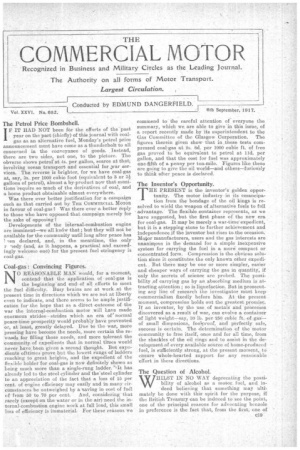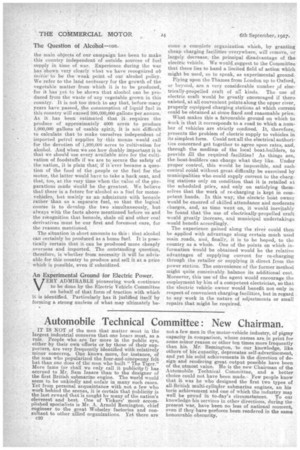The Petrol Price Bombshell.
Page 1

Page 2

If you've noticed an error in this article please click here to report it so we can fix it.
IF IT HAD NOT been for the efforts of the''past year on the part (chiefly) of this journal with coalgas as an alternative fuel, Monday's petrol price announcement must have come as a thunderbolt to all concerned in the conveyance of goods. . Instead, there are two sides, not one, to the picture. The obverse shows petrorat 4s. per gallon, scarce at that, involving .ocean transport and essential for .:_war services. The reverse is brighter, for we have coal-gas at, say, 3s. per 1000 cubic foot (equivalent to 3 or 3-1gallons of petrol), almost a by-product new that munitions require so much of the derivatives of coal, and a home product obtainable ,almost everywhere. Was there ever better justification for a. campaign such as that carried out by THE Oman:n(11AL MoTen in favour of coal-gas ? Was there ever a better reply to those who have opposed that campaign merely for the sake 9f opposing? Developments of the internal-combustion engine are imminent—we all kni5w that ; but they will not be available for the community until long after peace has ! 'en declared, and, in the meantime, the only r -necly (and, as it happens, a practical and exceedingly 'welcome one) for the present fuel 'stringency is C oal-gas.
Coal-gas : C.onvincing Figures,
NO REASONABLE MAN would, for a moment, contend that the application of coal-gas is the beginning and end + of all efforts to meet the fuel difficulty. Busy brains are at work _ at the present time in directions which we are not at liberty even to indicate and there seems to be ample justification for the hope that as a, direct outcome of the war the internal-combustion motor will have made enormous strides—strides which an era. of normal peace-time prosperity would probably have prevented or, at least, greatly delayed. Due to the war, more pressing have become. the needs, more certain the rewads for filling those needs, and more tolerant the community of expedients that in normal times would never have been given a second thought. But expedients ofttimes prove but the lowest rungs of ladders reaching to great heights, and the expedient of the flexible holder for coal-gas is now definitely shown as being much more than a single-rung ladder. It has already led to the steel cylinder and the'steel cylinder to an appreciation of the fact that a loss of 15 per cent. of engine efficiency may easily and in many circumstances be outweighed by a .saving in cost of fuel of from 50 to 70 per cent. And, considering that rarely (except on the water or in the air) needthe internal-combustion engine work at full load, this Small loss of efficiency is immaterial. For these reasons we commend to ' the careful attention of everyone the summary, which we are able to give in this issue, of a report recently made by its superintendent to the Gas Committee of the Glasgow Corporation. The figures therein given show that in ,these tests compressed coal-gas at 2s. 8d. per 1000 cubic ft. of free gas proved to be equivalent to petrol at lld, per gallon, and that the cost for fuel was approximately one-fifth of a penny per ton-mile. Figures like these are going to give the oil world—and others—furionsly to think after peace is declared.
The Inventor's Opportunity.
THE PRESENT is the inventor's golden opportunity. The motor industry -in its emancipation from thebondage of the oil kings is resolved to wield the weapon of alternative fuels to full advantage. The flexible container represents, as we have suggested, but the first phase of the new era for coal-gaS. It may be merely a war-time expedient, but it is a stepping stone to further achievement and independence if the inventor but rises to-the occasion. Motor manufacturers, users and the gas interests are unaninwus in the demand for a simple inexpensive system for carrying the fuel in a more compact or concentrated form. Compression is the obvious solution since it constitutes the only known other expedient. , But there may be one or more simpler, easier and cheaper ways of carrying the gas in quantity, if only the secrets of science are probed. The possibility of carrying gas by an absorbing medium is attracting attention ; so is liquefaction, But in prosecuting any line of research the investigator must keep commercialism fixedly before him. At • the present moment, compression holds out the. greatest promise. If an inventor, by the use of metals and processes discovered as a result• of war, can evolve a container of light weight—say, 30 lb. per 250 cubic ft. of gas—. ofsmall dimensions, foolceoof, and perfectly safe, success is certain. The determination of the motor community to free itself, once and for all time, from the shackles of the oil rings and to assist in the development 9f every available source of home-produced • fuel, is sufficiently strong, at the present moment„, to ensure whole-hearted support for any reasonable effort in these directions.
The Question of Alcohol.
WHILST IN NO WAY deprecating the possibility of alcohol as a motor_ fuel, and in-deed believing that something may ultimately be done with this spirit for the purpose, if the British Treasury -can be indoced to see the point, one of the principal reasons for advocating benzole in preference is the fact that., from the first, one of the main objects of our campaign has been to make this country independent of outside sources of fuel supply in time of war. Experience during the war has sh-own very clearly what we have recognized ab initio to be the weak point of our alcohol policy. We refer to the land necessary for the growth of the vegetable matter from which it is to be produced, • for it has yet to be shown that alcohol can be produced from the waste of any vegetable grown in this country. It is not too much to say that, before many years have passed, the consumption of liquid fuel in this country will exceed 300,000,000 gallons per annum. As it has been . estimated that it requires the produce of approximately 4000 acres to produce 1,000,000 gallons of usable spirit, it is not difficult to calculate that to make -ourselves independent of imported petrol supplies by this means would call for the devotion of 1,200,000 acres to -cultivation for alcohol. And when we see how doubly important it is that we should use every available acre for the cultivation of foodstuffs if we are to secure the safety of the nation, it is plain that', if it'ever became a question of the food of the people or the fuel for the motor, the latter would have to take a back peat, and that, too, at the very time when the value of the pieparationS made Would be the greatest. We believe that there is a future foralcohol as a fuel for motorvehicles but mainly as an admixture. with benzole rather Ian as a separate fuel, so that the logical course is to develop the two simultaneously, but always with the facts above mentioned before us and the rebognition that benzole, shale oil and other coal derivatives must be our first and foremost care, for the reasons mentioned.
The situation in short amounts to this : that alcohol can certainly be produced as a home fuel. It is practically certain that it can be produced more cheaply overseas and imported. The outstanding question, therefore, is whether from necessity it will be advisable for this country to produce and sell it at a price which is possible, even if subsidized.
An Experimental Ground for Electric Power.
VERY ADMIRABLE pioneering work continues to be doue by the Electric Vehicle Committee on behalf of that form of traction with which it is identified. Particularly has it juSlified itself by forming a strong nucleus of what may ultimately be come a complete organization which, by granting cheap charging facilities everywhere, will remove, or largely decrease, the principal disadvantage of the electric vehicle. We wouldssuggest to the Committee that there lies to hand a limited field of action which might be used, so to speak, as experimental ground.
Plying upon the Thames from London up to Oxford, or beyond, are a very considerable number of elec trically-propelled craft of all kinds, The use of electric craft would be greatly encouraged if there existed, at all convenient points along the upper river, properly equipped charging stations at which current could be obtained at &sine fixed and reasonable price. What makes this a favourable ground on which to Work is that it corresponds to a road to which a number of vehicles are strictly confined. It, therefore, presents the problem of electric supply to vehicles in its simplest form. Could not all the electrical authorities concerned get together to agree upon rates, and, through the medium of the local boat-builders, to provide dll the required facilities? As things are, the boat-builders can charge what they like. Under proper control, this would be impossible, and suchcontrol could without great difficulty he exercised by municipalities who could supply current to the charging stations only on condition that it is retailed at the scheduled price, and only on satisfying themselves that the work of re-charging is kept in competent hands. In this way, the electric boat owner would be ensured of skilled attendance and moderate charges, and, as time went on, it would inevitably be found that 'the use of electrically-propelled craft would greatly increase, and municipal undertakings .would benefit accordingly.
The experience gained along the river could then be applied with advantage along certain much used main roads, and, finally, it is to be hoped, to the country as a whole. One of the points on which information Would be obtained would be the relative advantages of supplying current for re-charging through the retailer or supplying it direct from the power station. The convenience of the former method might quite conceivablybalance its additional cost. Moreover, this use of the agent would encourage the employment by him of a competent electrician, so that the electric vehicle owner would benefit not only in respect of convenient charging facilities, but in regard to any work in the nature of adjustments or small repairs that might be required.
























